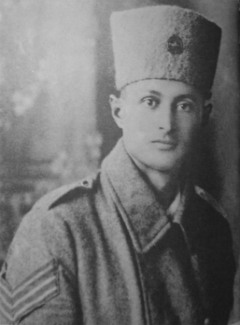Pages in Section 8

1941 Police Involvement in Syria and Iraq
ii. After Dunkirk
iii. OP Final Fortress
iv. Police Involvement in Syria and Iraq
v. The Lehi and Avraham Stern
vi. Britain's Break with the Palmach
During the 9th's Army preparations for the allied invasion of Syria, Police Deputy Superintendent Hegerty was given the task of co-ordinating military transport under the RASC. He requisitioned trucks from all over Palestine and set up testing-stations manned by RASC inspectors to ensure the trucks were fit for purpose.
Before the Syrian invasion took place, trouble flared up in Iraq. A rebel Iraqi army had encircled the RAF base at Habbaniya and the army sent out an expeditionary relief column (Habforce) over the Transjordan desert to relieve it. The Palestine police supplied Habforce with twenty trucks and volunteer police drivers. Habforce also included those Palestine Police who had been seconded to the Arab Legion. Haganah and Irgun members who had been arrested earlier, were released from custody to help with both Habforce and the Syrian invasion.
The newly formed mechanised 1st Regiment of the Transjordan Frontier Force was also part of Habforce. The TJFF was an imperial force recruited to work anywhere within the British Empire, so it came as a shock when D company of the Mechanised Regiment refused to cross over the boundary between Transjordan and Iraq. As a result of their mutiny D company were disbanded. However the TJFF redeemed themselves later in the Syrian campaign.
 Palestine police, who garrisoned the northern frontier, reconnoitered the situation in Syria with the invaluable help of several Arab-speaking members of the Notrim. Moshe Dayan was one of these. He had recently been released from prison, after being caught carrying arms after a guerrilla practice. He was assigned to a small Australian-Palmach-Arab reconnaissance task force using his home kibbutz of Hanita as a forward base. This unit,wearing traditional Arab dress, frequently infiltrated Vichy French Lebanon on covert surveillance missions. On return they passed on their findings to army intelligence. It was during the Syrian Campaign that Moshe Dayan lost an eye. (The photo on the left shows Moshe Dayan before he lost his eye.)
Palestine police, who garrisoned the northern frontier, reconnoitered the situation in Syria with the invaluable help of several Arab-speaking members of the Notrim. Moshe Dayan was one of these. He had recently been released from prison, after being caught carrying arms after a guerrilla practice. He was assigned to a small Australian-Palmach-Arab reconnaissance task force using his home kibbutz of Hanita as a forward base. This unit,wearing traditional Arab dress, frequently infiltrated Vichy French Lebanon on covert surveillance missions. On return they passed on their findings to army intelligence. It was during the Syrian Campaign that Moshe Dayan lost an eye. (The photo on the left shows Moshe Dayan before he lost his eye.)
During this period the British formed the Palmach, originally to penetrate enemy territory but, after the Syrian Campaign, to form guerrilla units inside Palestine to resist a likely German invasion. This latter deployment of Palestinian Jews was carried out by the army against British government policy for Palestine.
Only three days before the invasion of Syria, ASP John Flanagan was put in charge of a Police Mobile Column with British Sergeant P H Duke of Haifa CID as his Administrative Officer. In Syria the column came under enemy fire and at one time was trapped in a wadi, but extricated itself during the night.
Police officers, including members of the settlement police, offered to drive trucks for the 9th army,who were now based in North Palestine. Very senior residents of Haifa will remember the long stream of lorries that passed through the town.
The police truck drivers were all seasoned by the Arab Rebellion and knew all about road blocks and how to remove them under fire. B/C James Lidell received the British Empire medal for extricating his vehicle when caught in extensive firing. B/C Arthur Hilditch was so severely wounded he had to be invalided from the force in 1944. R D Skidmore was mentioned in dispatches after he drove ammunition up to the front line, On the way, after having to drive over dead bodies to get there he was confronted by a stone wall. Under enemy fire, he left the vehicle, and hauled the stones away before driving on.
When former Inspector General Morvogradato returned to the Levant as Brigadier responsible for the security of the 9th Army, the police became heavily involved in Intelligence Work. Apart from keeping a few army officers, Morvogradato chose to work with Palestine Police, who received army ranks, so two units drawn from the British police sections turned soldiers for the duration of the campaign. Members of one unit, under the command of Major (Deputy Superintendent) Musgrove, traveled to Beirut, where they were joined by Giles Bey and Sam Prosser of the CID. The other unit joined the push to Damascus.
(Most of this material has been extracted from Ch 9 of Edward Horne's "A Job Well Done". For more detail you would do well to read the whole chapter